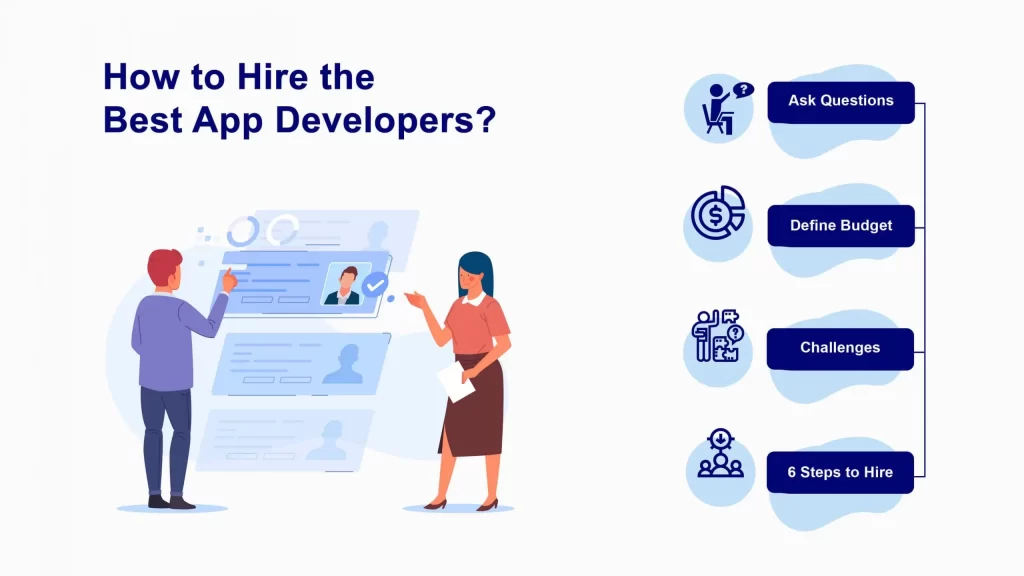So, you’re ready to launch your app. That’s exciting! But before you dive in, there’s a critical question to tackle: what’s the cost of hiring app developers? If you ask different people, you’ll likely hear a range of figures—sometimes wildly different ones.
According to Clutch, most app developers charge between $25 to $150 per hour. The average cost for mobile development projects usually falls between $10,000 to $50,000. But remember, these figures can vary widely based on several factors.
The truth is, the app development cost depends on multiple elements, including the developers’ experience, their geographical location, and their specific skill sets. Also, the final fee you pay to build your app is influenced by its requirements, complexity, collaboration methods, and much more.
So, before kicking off your app project, it’s crucial to look beyond just the hourly rate of your developers.

How Much Does It Cost To Hire App Developers?
When you think about hiring app developers, experience plays a massive role in shaping costs. Generally, developers fall into three categories:
- Junior Developers: They’re fresh on the scene and typically charge between $27 to $35 per hour. While they may take longer to complete tasks, they can be a budget-friendly option if you’re willing to invest time in their growth.
- Mid-Level Developers: With more experience under their belts, these developers usually charge $40 to $50 per hour. They bring a balanced mix of skill and efficiency, making them a great option for many projects.
- Senior Developers: These pros command higher rates—often between $50 to $150 per hour. Their expertise can save you time and ultimately reduce the overall cost of your project, as they can tackle complex issues swiftly.
The Importance of Location
Another key factor in determining the app developer price is their region or country. Here’s how it typically breaks down:
– United States: Expect to pay between $100 to $115 per hour.
– Eastern Europe: Rates are generally more affordable, around $50 to $65 per hour.
– India: Here, you can find developers charging between $20 to $50 per hour.
– Australia: Rates can range from $70 to $200 per hour, which is on the higher end.
Understanding these regional differences can help you make smarter hiring choices.
The Development Platform Matters
The platform (iOS, Android, Cross-platform) you choose for your app also has a significant impact on the app development cost. Are you focusing on building for iOS, Android, or opting for a cross-platform approach? Each of these options comes with its own pros and cons:
– iOS Development: Often more expensive due to Apple’s stringent guidelines, but can yield higher returns.
– Android Development: More flexible but may require extensive testing across various devices.
– Cross-Platform Development: A cost-effective solution that allows for a single codebase, but keep in mind it might have some limitations.
How Developers Set Their Rates
You might wonder how developers arrive at their rates. Here are a few common models:
Hourly Rates
Hourly rates are a common model used by freelance developers, where they charge based on the number of hours they work on your project. This can include everything from designing and coding to testing and debugging. The benefit of this model is flexibility; it allows you to make adjustments as the project progresses. However, the total cost can be difficult to predict because it’s tied to the number of hours worked.
Project-Based Rates
For those who prefer predictability, project-based rates offer a fixed price for the entire app development process. In this model, developers assess your project requirements upfront and provide a quote. This gives you control over your budget and ensures no surprise expenses later on. However, it requires detailed planning before development starts to avoid delays or extra costs.
Retainer Agreements
If you’re working on a long-term or complex project, a retainer agreement might be the most beneficial pricing model. Under this model, you pay developers a fixed monthly fee for a set number of hours. It offers consistency and stability, allowing for ongoing development. This is useful when you need continuous updates or have a large-scale project requiring months to complete.
Understanding these models can empower you to choose what works best for your needs.

What Affects App Developer Costs?
Several factors can sway app developer pricing:
– Technical Skills: More specialized skills usually come with higher costs. If you need a developer proficient in cutting-edge technologies like AI or blockchain, be prepared to pay more.
– Experience Level: More experienced developers naturally command higher rates.
– Project Complexity: More complex projects requiring advanced features will generally raise your costs.
Tips to Save on Developer Costs
Reducing costs while hiring app developers is definitely possible with a few smart strategies. Here’s how:
- Outsourcing vs. Local hiring: Consider the benefits of both approaches. Outsourcing to developers from regions with lower living costs can save you money, while local hiring offers the advantage of better communication and collaboration.
- Hybrid Approach: You could also adopt a mix of both, outsourcing development while hiring a local project manager to oversee the work.
Final Thoughts
The cost of hiring app developers is influenced by various factors, from their experience and location to the platform you choose for your app. By understanding these dynamics and making informed decisions, you can effectively manage your app development budget. If you’re ready to explore tailored solutions, consider why hiring developers from Code Genesis might be the best choice for your project.